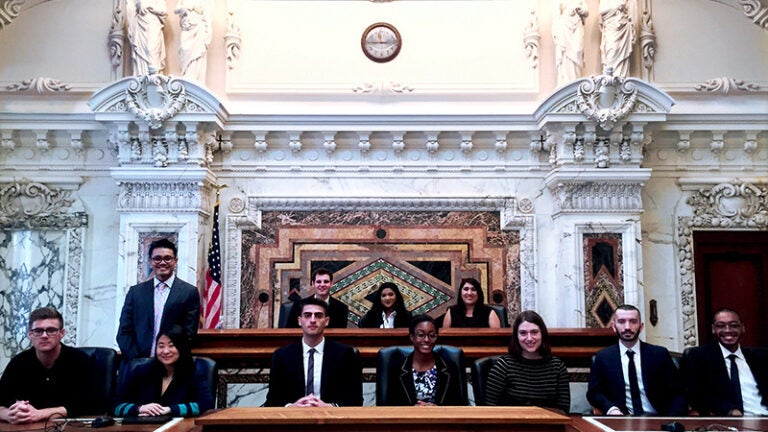
Students get rare insights into inner workings of our legal system
As the seven justices on the California Supreme Court filed into the San Francisco court house, the first thing Chief Justice Tani Gorre Cantil-Sakauye did was welcome the 10 USC undergraduates and their instructor, gathered in the audience. The group had traveled to San Francisco in October to hear oral arguments presented before the court as part of Antonio Elefano‘s “Advanced Legal Writing” course, an upper division elective offered by The Writing Program at USC Dornsife.
Cantil-Sakauye’s gesture impressed the students. “It’s one thing to be in the room and it’s another to have our class be acknowledged by the Chief Justice and be on the record at the court,” said Elefano, assistant professor of writing.
Aimed at students serious about working in law, politics or policy, Elefano’s course enables them to learn the art of legal writing by studying current cases going before the California Supreme Court and then by researching cases to recommend to Southwestern Law School’s Amicus Project. The latter enables law students to gain practical experience by preparing amicus — or “friend of the court” — briefs on a pro bono basis.
First, students learn how to write a legal appellate brief. They then research California Supreme Court cases, exploring underlying background and case law and drafting briefs before engaging in oral arguments. Elefano acts as the judge during this mock court session, firing questions at the students to press the logic and consequences of their conclusions. The group then travels to San Francisco to watch appellants and respondents make oral arguments for these cases before the court.
This year, the students were struck by how closely the trial arguments tracked to those they had made in class earlier.
“It was exciting to watch it play out, both in terms of what was similar and also what was different and how the litigants changed their strategy,” Elefano said.

Psychology major Erica Kelley (center) presents oral arguments with fellow students at a mock court session held during the “Advanced Legal Writing” course. Photo by Susan Bell.
Erica Kelley, a senior majoring in psychology, described seeing how a Supreme Court case is conducted as “eye-opening.”
“It’s not something that most people have the opportunity to see in their lifetime. … Maybe that could be me eventually, arguing a case before the Supreme Court.”
During their three-day trip to San Francisco, the students also visited the historic Ninth Circuit court building and toured U.C. Berkeley School of Law.
Once back at USC, the students shifted perspective. Groups who previously argued cases from opposing perspectives came together as a judicial panel and — based on everything they had learned about the case — drafted judicial opinions.
All the way to the United States Supreme Court
During the second half of the course, faculty from Southwestern Law School visit USC Dornsife to enlist students’ help in finding cases for their Amicus Project.
For example, in a prior case, a former USC Dornsife student suggested to Southwestern law faculty that they look at a search and seizure case involving a suspect’s mobile phone. It may sound straight forward, but as Elefano points out, the implications for the legal system and for citizens nationwide are far-reaching.
“What are our privacy rights with regard to our phones, with regard to our information?” he said.
At the end of the semester, USC Dornsife students summarize their chosen case in front of a panel of Southwestern law professors, arguing why it’s important that it be adopted as an amicus brief. If their case is retained, it could end up before the U.S. Supreme Court.
“What we’re doing in this course really could have an impact and really make a change with regard to far-reaching law,” Elefano said. “There aren’t any other undergraduate legal writing students who are given this kind of opportunity and this kind of input.”
A rare learning opportunity
Elefano was an English major before earning his law degree from Yale Law School in 2005 He worked as a corporate litigator in New York City for five years before his love of writing won out.
After earning an MFA from Boston University, he taught creative writing there and at the University of Houston before joining USC Dornsife in 2014.
He’s passionate about the course, which he initially co-taught with its founder, Professor Emeritus of Writing James Brecher, whom Elefano considers to be “the father of undergraduate legal writing.”
“This isn’t something that I had as an undergraduate,” Elefano said of the USC Dornsife course. “There are very few programs in California, or in the country, that teach this.”
During their visit to the California Supreme Court, he noted, the class was particularly struck by one case where they could tell the attorney was probably going to lose.
The students got to talk to the lawyer right after he made his argument, asking him questions about his strategy and his opinion of the arguments.
“For them to be able to see that,” Elefano said, “to watch it play out, to talk to the lawyer afterward — there’s no substitute for this as a learning experience.”